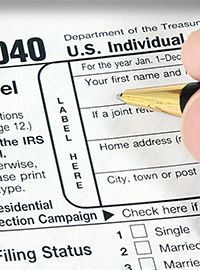| Two-Thirds of ObamaCare Subsidy Recipients Had To Pay Back the IRS |
 |
|
By Ashton Ellis
Wednesday, April 29 2015 |
If you like your ObamaCare subsidy, chances are you won’t be able to keep it. “Almost two-thirds of tax filers who received insurance via the state or federal insurance Marketplaces had to pay back an average of $729,” according to an analysis by H&R Block. That translates into a 33 percent reduction in the average refund. This feature of ObamaCare is known as the “clawback” provision. It allows the Internal Revenue Service to impose fines on people whose income during the year turned out to be higher than originally estimated. Non-salaried workers are being hit particularly hard. For example, “If you’re a person who is a waitress or worked for a landscape company and you’re asked how much money you’re going to make, you’re really just throwing a dart at the board,” explains Timothy Jost, a Washington and Lee University law professor. The headaches are likely to get worse. “With current Marketplace enrollment figures at 11-plus million there is a potential for more taxpayers to have to repay a large portion [of their subsidy] during next year’s tax filing season,” says an H&R Block executive. “There was quite a bit of new [ObamaCare] related complexity for taxpayers to deal with this season. But our figures highlight the importance of estimating income as accurately as possible when applying for premium tax credits and notifying the Marketplace with any life changes that impact annual household income or size.” Theoretically, the clawback provision is understandable because it tries to ensure that people only receive the subsidy amount their income entitles them to. Other federal entitlements – such as the food stamps program – also include clawback provisions that require repayment of funds even if the government incorrectly calculates the benefit amount. In the food stamps example, however, eligibility must be confirmed every six months, eliminating the potential for costly penalties to accumulate at the end of the year. By contrast, ObamaCare’s clawback provision has no such safeguard. After asking non-salaried workers to ‘throw a dart at the board,’ it merely suggests contacting the relevant ObamaCare exchange to report information that could affect the subsidy amount – things like a raise, marriage or childbirth. Apparently, ObamaCare consumers haven’t yet been conditioned enough to remember to call a government agency when major life events happen. That’s likely to change as ObamaCare’s clawback penalties escalate. In 2016 the base fine for not having insurance coverage will jump to the greater of $325 per adult, or 2 percent of household income. That’s a significant spike from this year’s threshold of the greater between $95 or 1 percent of household income. Moreover, next year ObamaCare’s enforcement mechanisms will extend to all tax filers, not just the ones who either failed to have insurance coverage or qualified for a subsidy. By 2016, the law’s controversial employer mandate will go into effect, generating mountains of paperwork as every adult in the United States tries to prove – to the IRS’ satisfaction – that he or she is either covered or exempt. For their part, employers will be tasked with navigating waves of pent-up regulations. The most critical will hit small businesses. These will have to justify every part-time and full-time employee classification. They must keep in mind that, under ObamaCare, 30 hours of work per week qualifies a person for federally defined ‘affordable’ health insurance. A single mother or hardworking college student who needs the extra money won’t get the extra hours. Expanding profit margins and job opportunities will take a back seat to managing compliance issues. All of these real world data points undermine the liberal claim that ObamaCare subsidies are sacrosanct, and that people will be worse off if the U.S. Supreme Court prohibits the IRS from making them available beyond what the law allows. As this year’s tax data indicates, forcing Congress to rethink ObamaCare’s subsidy design might be the best decision the Court makes this year. |
Related Articles : |
























